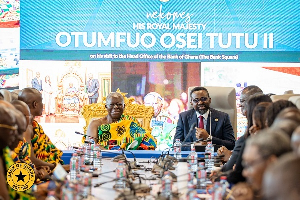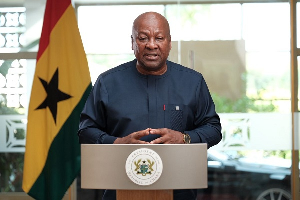The Roads and Highway ministry has taken a swipe at the NPP's running mate Dr. Mahamudu Bawumia over what it says were misrepresentations in his analysis of the road sector in the country.
A statement issued by the ministry said Dr. Bawumia's presentation was riddled with factual inaccuracies and untruths.
Below are details of the statement by the ministry
BY: DEVELOPMENT CHALLENGE (DC)
DATE
08/09/16
PERSON/INSTITUTION
Dr. Mahamudu Bawumia, Vice Presidential Candidate of the NPP at a lecture at the National Theatre in Accra.
ISSUE/SUBJECT MATTER
Economic Performance, i.e GDP Growth Rate
CLAIMS
? Without oil, under NPP GDP increased from 3.7% in 2000 to 9.1% in 2008.
? With oil, under NDC GDP declined to 3.9% in 2015.
? Between 2000 and 2008, the size of Ghana’s economy increased from some $5.1 billion to $28.5 billion, a 459% increase in eight years, even in the face of a global economic and financial crisis in 2007/8 (with oil prices reaching a record high of $147/barrel)
? Ghana’s GDP, notwithstanding the discovery of oil, has only increased from $28.5 billion in 2008 to a projected $40 billion in 2016 (a 40% increase in eight years)
THE FACTS
The above is riddled with factual inaccuracies. They include:
?GDP growth for 2008 was 8.4% (Ghana Statistical Service) not 9.1%
?Eight years of NDC ends in 2016 and the GDP growth for 2016 is 4.9% {Ghana Statistical Service} not 3.9%
? The size of Ghana’s economy was Gh¢30.179 billion in 2008 (in cedis), an equivalent of $7.7 billion representing 20% increase and not $28.5 representing 459% increase, as claimed by Dr. Bawumia
?This was quadrupled to Gh¢133.34 billion (in cedis) as of June 2015, an equivalent of $34 billion representing an increase of 64%, indicating a far superior economic performance by the NDC administration. The averages analysis indicated earlier support this fact (5.8% for NPP and 7.3% for NDC for each 8-year period).
OBSERVATIONS AND CONCLUSIONS
?NPP selects a single year of the party’s GDP growth (8.4% in 2008)
?Again, it selects a single year of NDC's GDP growth (4.9% in 2016)
?Then proceeds to draw conclusion of the party’s better economic performance compared to the NDC
?Above conclusion is erroneous and disingenuous.
?Economic performances over certain time frames are measured in averages.
?Therefore, the comparison must be made using the 8-year period of the NPP to the 8-year period of the NDC, which is 5.8% and 7.3% respectively.
?Besides, 4.9% of a larger economy (Gh¢133.34 billion as of June 2015) is greater than 8.4% of a smaller economy (Gh¢30.179 billion in 2008).
?That is why Ghana and many other developing countries cannot be seen to be doing better economically, than most developed nations who are currently growing under 2%.
?Also, highest growth under NPP was 8.4% in 2008 and highest growth under NDC was 15.0% in 2011.
NOTE: ALL CONVERSIONS ARE DONE USING THE STANDARD PREVAILING EXCHANGE RATE OF $1 TO 3.9 CEDIS.
SUPPORTING FACTS
GHANA’S GDP GROWTH RATE FROM 2001 TO 2016
2001-2008 (NPP)
2001- 4.0%
2002- 4.50%
2003- 5.20%
2004- 5.6%
2005- 5.9%
2006- 6.4%
2007- 6.5%
2008- 8.4%
TOTAL - 46.5%/8yrs = 5.8%
2009-2016 (NDC)
2009- 4.0%
2010- 8.0%
2011- 15.0%
2012- 8.8%
2013- 7.6%
2014- 6.9%
2015- 3.9%
2016 - 4.9%
TOTAL- 59.1%/8yrs = 7.3%
Source: Ghana Statistical Service
AUXILIARY INFORMATION
?Any assessment of economic growth (GDP) without due regard to budget deficits is a mathematical impossibility (Ricardian Principle of Equivalence in Economic Analysis)
?In view of the above, the NPP government left behind a budget deficit of 24.2% (2008 Budget Deficit Revised to 24.2% of GDP, ghanaweb.com, General News of Tuesday, 25 August 2009 Source: Bloomberg)
?Budget deficit for 2015 was 6.3 and projected to end 2016 at 5%
?Therefore, using the NPP’s logic of selectivity, GDP growth of 8.4% in 2008 with a budget deficit of 24.2% in the same year, (spending money you do not have) cannot be better in economic performance compared with 4.9% with a budget of deficit 6.3%.
?Most contractors were not being paid under the NPP administration because of the grievous budget deficit situation. Contractors were awarded contracts, ostensibly to register higher economic growth figures without money (high budget deficit) to pay them.
?Under the current NDC administration, below are excerpts of how funds are generated and disbursed without creating unnecessary stress (high deficits) for the budget.
Revenue generation:
The total revenue accrued into the Road Fund increased from GH¢ 191 million in 2010 to GH¢ 323.98 million in 2015. The passage of the Energy Sector Levies Act 899 led to an upward adjustment of the fuel levy from GHS 0.073 to GHS 0.40. Out of the 2016 projected revenue of GH¢ 1.2 billion, a total of GH¢ 627.4 million was accrued by the Fund between January and July 2016. The Annual revenue from 2010 to 2016 is as follows:
ROAD FUND REVENUE Year GHS Million
2010- 191.42
2011- 209.13
2012- 241.37
2013- 271.03
2014- 311.02
2015- 323.98
(Jan - Jul) 2016- 627.4
2016 Road Fund Budget Allocations
The Fund allocated a total of GHC1.056 billion (88% of the projected revenue) to the three road agencies (GHA, DFR & DUR) to primarily undertake routine and periodic maintenance works for 2016 and to settle outstanding indebtedness.
Funds have been allocated towards toll operations, safety activities by NRSC and DVLA, operations of the Secretariat and Emergency Works. The fund also allocated GHS 1.0 million towards equipping the Ghana Police Service to improve road safety enforcement activities.
A total of GHS 618 million has been disbursed for maintenance works and activities of the beneficiary agencies between January and July 2016.
The fund carried an indebtedness of GHC336.14 million into the year 2016 which were mainly outstanding payments for works executed by Road Contractors. An amount of GHS 350million has been paid to contractors as at end of June 2016 for work executed. Additionally an amount of GHS 70 million has been paid to contractors under the Cocoa Roads Programme.
It should be noted that, the recent increases in revenue to the fund will not yield an immediate impact on the condition of the road network as significant portion of the inflows will go towards the settlement of indebtedness to road contractors. It will however, provide the assurance of consistency of maintenance work which will eventually lead to improved condition of the network.
The road network is continuously expanding through the creation of new districts and municipalities which hitherto did not have their road networks on the national inventory. The recorded network size has nearly doubled over the past ten years from 37,000km in 2000 to about 71,418km currently.
This rapid expansion of about 6% per annum that has resulted from more communities in the rural areas being connected to the feeder road network, missing links being joined to the trunk road network and roads in newly declared municipal and metropolitan areas being added to the urban road network, requires even more resources for maintenance.
General News of Sunday, 11 September 2016
Source: starrfmonline.com













